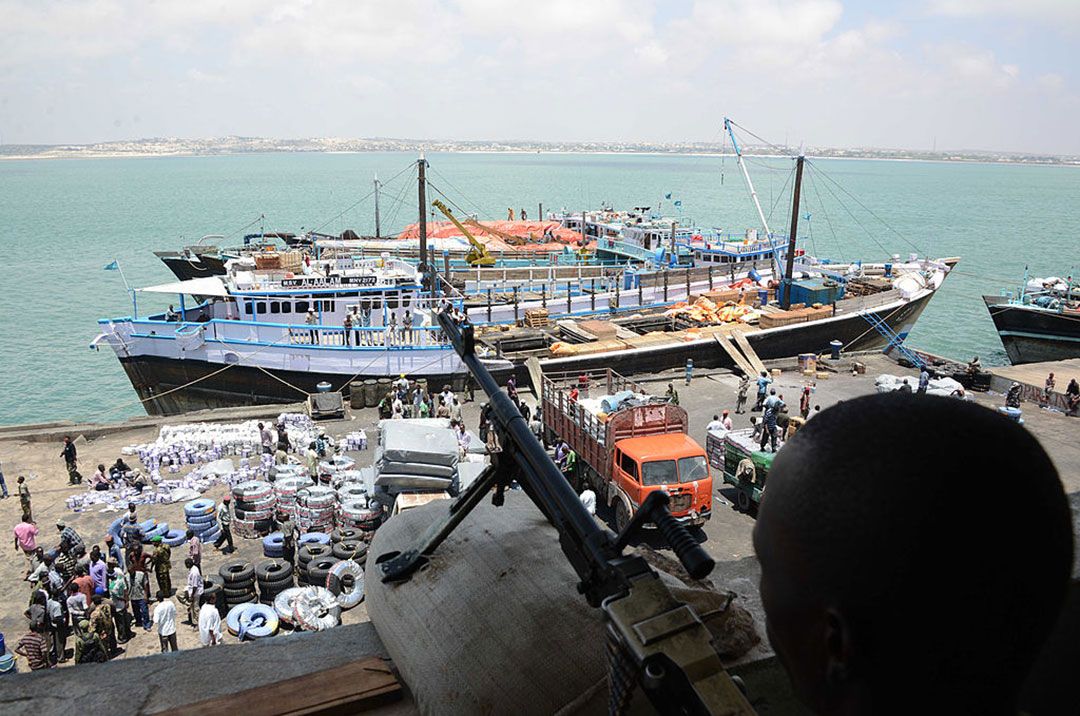Illegal Maritime Trade Sustains Terror Groups
ADF STAFF
Members of the Ansar al-Sunna terror group recently raided Mocimboa da Praia, a major port in Mozambique’s embattled Cabo Delgado province.
Once known for attacking small villages with machetes, the terror group successfully fought off mercenaries, sank a Mozambican military vessel and seized a cache of weapons in August. The port is used for deliveries to nearby natural gas projects worth about $60 billion.
Ansar al-Sunna’s short-term occupation of Mocimboa da Praia and numerous islands off the coast helps the group control maritime infrastructure for operational support and access illicit trade routes for funding, according to an October report by Stable Seas, an organization that works to eliminate illicit maritime trade.
Experts cite the group’s recent activity along the coast as evidence that it is growing in numbers and gaining valuable experience.
“They are not bandits anymore. They are well-trained fighters,” Jasmine Opperman, a South African analyst for the Armed Conflict Location & Event Data Project, told NPR.
Ansar al-Sunna is not alone in exploiting weaknesses in East Africa’s weak maritime security to accomplish its goals. Terrorist organizations al-Shabaab and the Islamic State in Somalia (IS-Somalia) routinely engage in human trafficking, and smuggle weapons, fighters and illicit goods to finance and grow their operations, according to a recent report by the Institute for Security Studies (ISS).
Al-Shabaab helps fund its organization by taxing and smuggling about $7 million in charcoal annually in Somalia, where the group has been active since 2006. The illicit operation typically exports charcoal to nations across the Gulf of Aden and to Iran, the largest importer of Somali charcoal.
In 2012, the United Nations Security Council banned the export of charcoal from Somalia, where 1.5 million acacia trees are cut down every year. Experts warned that the country could have no trees left by 2060.
“It is important we stop the illegal trade in charcoal,” Commodore Steve Dainton of England’s Royal Navy said in 2019 during a conference on maritime security. “Not only will that cut off a source of funding to Somali terrorists, but it will also slow down the deforestation of part of Somalia.”
A think tank in late October found that al-Shabaab rakes in $15 million per month in Somalia through an elaborate system that collects taxes and charges fees on activities such as crossing checkpoints, running businesses, irrigating crops, selling land, and importing and exporting goods. According to a Hiraal Institute study, al-Shabaab’s tax collectors collect almost as much money every month as the government in southern Somalia.
Formed by former al-Shabaab members, IS-Somalia imports weapons and fighters from the Islamic State in Yemen across the Gulf of Aden. The group uses smuggling networks and local agreements to receive the goods at ports and landing sites along coastal areas in Somalia and Tanzania, according to the ISS report.
Although terror groups are gaining notoriety for exploiting East Africa’s coastline, Ian Ralby, former faculty lead for maritime law and security at the Africa Center for Strategic Studies, argued recently that maritime security efforts in Africa have developed rapidly in the past decade. In an interview with the center, he cited the Djibouti Code of Conduct as one of the continent’s “main pillars of maritime security.”
The Djibouti Code of Conduct aims to combat piracy and armed robbery against ships in the Gulf of Aden and Western Indian Ocean. It was signed by several Middle Eastern countries and nations along East Africa’s coast, from Egypt to South Africa.
Timothy Walker, maritime project leader at the ISS, argued in the institute’s report that some counterpiracy operations could help prevent terrorism in waters of participating states. He cited as examples Operation Prosperity in the Gulf of Guinea, where Nigerian and Beninese navies collaborate to strengthen maritime security, and Operation Copper, in which South African naval forces are deployed in Mozambique.
The ISS report contends that counterterrorism efforts against extremist groups in East Africa have never properly examined how the oceans help terror groups thrive. It maintains that future prevention measures should specifically address illicit maritime activities.


Comments are closed.